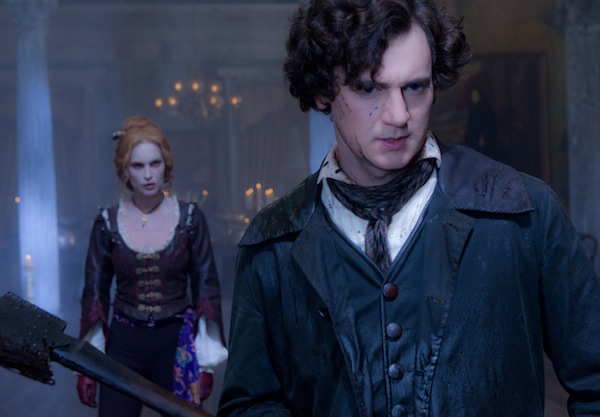Sharpening the Axe, by Rita Cannon
I didn’t know until I got to the screening of Abraham Lincoln: Vampire Hunter that it was in 3D. In hindsight, it seems crazy that I hadn’t assumed it would be. This is exactly the sort of movie that begs for 3D, and not the subtle kind. The sheer volume of things that come flying directly at the audience throughout the film is staggering: bullets, whips, fire, axes, shards of broken wood, and of course, dozens of gaping vampire maws and ribbons of slow-motion blood. I wholeheartedly recommend seeing it in 3D, because it adds another layer to the unabashed more-is-more aesthetic that makes this incredibly silly film work as well as it does.
And boy, is it ever silly. In case the title wasn’t clear enough, Abraham Lincoln: Vampire Hunter presents an alternate version of history in which our sixteenth president, played here by Benjamin Walker, maintained a secret double life as a killer of vampires since he was a young man. Indeed, the vampire hunting predates and, according to this movie, frequently takes precedence over his legal and political aspirations. Under the tutelage of mysterious vampire expert Henry Sturges (Dominic Cooper), Lincoln spends his life tracking down Jack Barts (Marton Csokas), the vampire who killed his mother when he was a child, only to discover that vampires are actually trying to take over the United States, which then turns out to be linked to the Civil War in ways I couldn’t really follow. I guess a lot of vampires were pro-slavery? I don’t know. The point is that vampires were bad, and Lincoln had to kill them, and he did, and it looked pretty awesome.
Director Timur Bekmambetov uses a lot of the same visual techniques he brought to 2008’s Wanted: super slow motion, extreme close-ups of things getting shot apart, and a camera that never stops flying around. But where Wanted sometimes veered into dour oppressiveness, Vampire Hunter never loses grip on its tone, and there’s enough breathing room between the bombastic set pieces to keep your optic nerve from going numb. The action is exciting, inventive, and sometimes willfully ridiculous. Highlights include a reimagined Battle of Gettysburg in which most of the Confederate soldiers are vampires, and a stampede scene that climaxes with Jack Barts literally throwing a horse at Lincoln (he misses). The 3D is really turned up to eleven on this movie, which mostly works, though some of the more kinetic action scenes occasionally get a little muddy. Even the quiet, indoor dialogue scenes have a conspicuous amount of 3D dust floating in the air.
The only time the film lags is when it’s dealing with some of the more serious true events of Lincoln’s life. His son Willie, who died at the age of eleven from typhoid fever, is featured here, and he does die, though in the film it’s distinctly vampire-related. This is followed by a rather uncomfortable scene in which Lincoln’s wife Mary (Mary Elizabeth Winstead, who is sorely underused) tearfully blames him for Willie’s death. (The Lincolns had three other sons, only one of whom lived to adulthood, but they apparently don’t exist in this universe.) It’s the only moment of raw emotion in the film, and it doesn’t really work – partly because Bekmambetov and the actors seem afraid to fully commit to it, and partly because we just saw someone throw a horse at another person, and it’s kind of hard to come back down to earth after that.
It’s not long, however, before the action kicks back in for a thrilling finale set in and around a speeding train. The film ends on a high note, but also a darkly clever one that acknowledges the demise Lincoln will ultimately meet, and hints at who might be doing the vampire slaying now that he’s not around anymore. It’s a fitting end for a movie that’s so refreshingly weird and inherently watchable.






























Rita Cannon is one of the few critics who came close to appreciating the excellence of this film. In my view, it’s nearly perfect, so Elizabeth Winstead isn’t “sorely underused,” she’s used exactly the right amount, etc. Cannon refers to the “darkly clever” ending scene that acknowledges Lincoln’s imminent demise, but ignores one of many cheap but well-constructed thrills in the dialogue here. Appearing to somehow know that Lincoln’s mortality is going to catch up with him VERY soon, Lincoln’s mentor suggests that he make him immortal. Lincoln replies confidently “Vampires aren’t the only things that are immortal.” And we’ve just seen him deliver the most memorable parts of the Gettysburg Address. Game me chills, honestly.